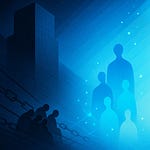"What exactly is populism?”
A listener asked me this after my recent Cantonese podcast. It's such a simple question, but it really made me think. We throw this word around all the time, don't we? Populism this, populism that. But what does it actually mean?
I started looking into it, and here's what struck me: almost everyone uses 'populism' as a label to attack their opponents. If you're on the left, you call the right populist. If you're on the right, you point to left-wing populism. It's become just another political weapon. But here's the thing - populism isn't limited to any one side. It's everywhere in politics today.
So what is it really? Here's what I've come to understand: populism is when we focus on leaders instead of the quality of the solutions. It's when we believe that if we just find the right hero, all our problems will magically disappear.
Think about it - we love hero stories, don't we? Hollywood makes billions selling us tales of heroes saving the day. And every four years, our political system tries to sell us the same story - just elect this hero, and everything will be fine.
But here's the catch - every hero needs a villain. As writer Eric Hoffer once said, you don't need people to believe in a god to start a movement, but you absolutely need them to believe in a devil. Without someone to blame, who needs a hero?
And this is where things get really interesting. These political 'heroes' love to talk about 'power to the people.' But what are they actually doing? They're taking advantage of people who feel powerless and scared about all the changes happening in our world.
Let me give you an example: immigration. It's an easy target, right? Got problems with crime? Blame immigrants. Economy not doing well? Must be the immigrants. It's a simple story that makes people feel better. But let me share something I've seen firsthand.
After the Communist Party took over China, millions of people fled to Hong Kong. Now, what did Hong Kong do? The British colonial government let them stay. Not because they were being nice - they did it because Hong Kong's factories needed workers. And you know what happened? When everyone could find work, nobody complained about refugees stealing jobs or causing crime. Actually, these immigrants helped make Hong Kong's economy boom.
Here's the really fascinating part: when did people stop coming illegally to Hong Kong? After China started its economic reforms in the 1980s. When people could make a decent living at home, they stayed home. Simple as that.
Now, I know what you're thinking - the U.S. and Europe can't control what other governments do. True. But this tells us something important about how to actually solve problems. Instead of just building walls and making threats, maybe we should be thinking about why people leave their homes in the first place. My friends working in different free market think tanks are trying to propose solutions. We need more people like them working on the solutions, not looking for people to blame.
We hear a lot of talk about an 'invasion' of immigrants these days. But let's think about this: when people can't feed their families, they'll do whatever it takes to find opportunities. The next administration says they'll kick out all illegal immigrants. Sounds tough, right? But here's the reality - it'll cost a fortune, and it won't work. Worse, it'll just push people into the shadows where criminals can exploit them.
We see the same pattern with the economy. Things getting expensive? Must be those greedy businesses or foreign countries! Just let the government control everything and prices will magically go down. Except that's not how the real world works, is it?
Here's what bothers me most about populism. While these leaders claim they've the solutions, they're actually doing the opposite. Real solutions don't come from some hero on a white horse. They come from millions of people making their own choices, working together, trading freely, solving problems in ways no central planner could ever imagine.
I know this isn't a popular message right now. Everyone wants simple answers. Everyone wants someone to blame. But sometimes speaking freely means saying things people don't want to hear. Yes, we have real problems. But we won't solve them by giving up our power to think for ourselves.
So next time someone offers you a simple solution or tells you exactly who to blame for all your problems, remember this: true power doesn't come from leaders who claim to speak for 'the people.' It comes from people like you and me, making our own choices, working together freely, finding real solutions to real problems.
That's not just democracy - that's freedom.













Share this post